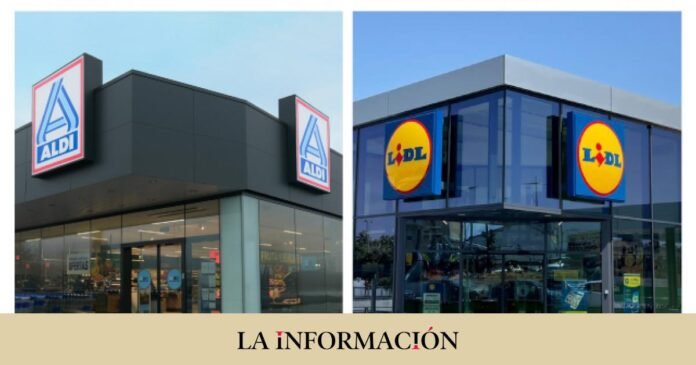Competition in the food market in Spain is still in full swing despite the rise in prices in the shopping cart, which threatens to weigh down consumption and affect the bottom line of the chains. Until now, he does not seem to have noticed it, according to what is extracted from the 2022 results that have been released, but everyone agrees that difficult times are ahead due to inflation. Carrefour, with four stores less than the previous year, increased its sales by 10%; while Día, which activated the sale of 235 establishments to Alcampo, has seen its sales grow by 5.4%.
But if there are two chains that have not ceased in their efforts to grow in Spain, those are Lidl and Aldi. German supermarkets, which have already accumulated more than two decades of presence in Spain, are advancing with their expansion plans throughout all territories and their openings of new stores reach a rate equivalent to one week. Without going any further, Aldi plans to open a total of 50 stores throughout Spain throughout this 2023. Its competitor, for the moment, has not wanted to advance its annual forecast.
So far this February, Aldi has opened its first store in Lanzarote (Arrecife) and the second in Asturias (Siero), and has opened stores in Masnou (Barcelona) and Valdebebas (Madrid). In March he will arrive in Córdoba, Valencia and Can Picafort (Mallorca), and throughout the year he will expand his presence to Melilla, hitherto unknown territory.
The rest of the openings will be distributed throughout Galicia, Asturias and the archipelagos, although half of the openings will be located in their strategic regions: Madrid, Catalonia, Andalusia and the Valencian Community. Its recruitment forecasts rise to 700 new employees in the first half of the year, reaching 7,400 in Spain at the end of June 2023.
For its part, Lidl has opened another five stores this month in three different autonomous communities: Malaga, Jerez de la Frontera and Huércal-Overa (Andalusia), Quintanar de la Orden (Toledo) and Alicante after investing 25 million euros. To these is added the center opened in January in the Madrid town of Alcalá de Henares. In 2022, it opened 41 stores and modernized a dozen more after an investment of 290 million.
Logistics, a key part of growth
But these growth plans are not limited to stores: new customer demands require new and larger infrastructures that adapt to issues such as online shopping. Lidl currently has 11 logistics platforms throughout the country, but has planned to launch another 5: Two are already under construction in Escúzar (Granada) and Parla (Madrid); another has recently been announced in Leon to serve the northwest of the peninsula; and has projected another two in Martorell (Barcelona) and Constantí (Tarragona), which are added to the three open since 2019.
Aldi, for its part, is working on the start-up of two logistics platforms in Miranda de Ebro (Burgos) and Sagunto (Valencia), both with the idea of being fully operational by 2024. It currently has another five operational, one inaugurated in Gran Canaria last year and two others (Andalusia and Catalonia) expanded.
Lidl claims to have doubled its impact on Spanish GDP since 2016, which today would be equivalent to 0.65% of the total up to 7,000 million euros. It will close its 2022 accounts with a total of 670 stores in Spain, while its competitor ended the year with 394 stores and 6,600 employees. 40 of these stores opened in the last twelve months.
Same store model, different target audience
Both companies have advocated basing their expansion on a similar store model: sales rooms with a surface area of about 1,500 square meters and parking available for more than 100 vehicles. After improving their visual proposal and the quality of their private label, both companies have turned towards having more fresh and local products, with regional and international references. The new stores also have a bread and pastry workshop in store, and maintain the bazaar.
Although both chains have their strength in the urban peripheries, where the availability of land to locate their stores is usually much greater, they have begun their immersion towards urban centers, even if it is at the cost of having to remove the parking lots. In 2022, the Lidl openings in the city of Madrid were located in neighborhoods on the working class periphery such as La Elipa, Quintana, Abrantes or Campamento, replacing old commercial galleries. Aldi, for the moment, has planted its new store model in the PAU of Valdebebas, one of the highest income in the capital.

